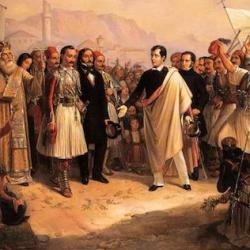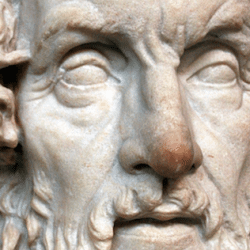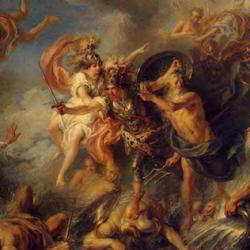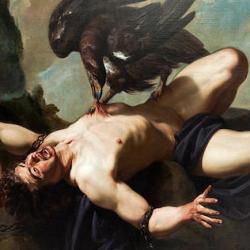As Hugo Rahner made clear in his classic study of the patristic uses of Greek myth, the church fathers saw Christ anticipated not only in the OT but in ancient literature and philosophy generally. Some examples:
In Plato’s Republic (2, 361d-e), Glaucon describes the perfectly just man as one who will be “whipped; he’ll be racked; he’ll be bound; he’ll have both his eyes burned out; and at the end, when he ahs undergone every sort of evil, he’ll be crucified and know that one shouldn’t wish to be, but to seem to be, just.” Clement of Alexandria comments in the Stromata that Plato’s thought here is quite close to that of Wisdom 2:12 (“let us remove the righteous man from us, because he is troublesome to us”). And, of course, the account matches the experience of Jesus, the Just.
Clement says this about Odysseus and the Sireens: “It seems to me that most of those who subscribe to the name of Christian are like the companions of Odysseus; for they approach our doctrine without any sense of high culture. It is not so much the Sirens that they sail past and put behind them as the rhythms and melodies (of the genius of Greece). They stop their ears by their rejection of learning because they would never find their way home again once they had opened their ears to the wisdom of Greece. Yet he who seeks to choose what is serviceable in all that for the instruction of catechumens – especially since many of these are Greeks (for the earth is the Lord’s and the fullness thereof) – should in no wise turn aside from the love of wisdom like a beast without reason. On the contrary, he should make a kind of beggar’s collection – and that on as liberal a scale as he can – of helpful things (from the wisdom of the Greeks). All that we must guard against is that we should dally there and go no further instead of returning home again to the true philosophy.” In short, be like Odysseus and don’t listen to the Siren song of the heretics.
And Maximus of Turin sees the Sireen episode as a type of the crucifixion: “If the story of this Ulysses tells that his binding to the mast made him secure against all danger, how much more loudly must I proclaim that which truly came to pass! – namely that in our own day the mast of the cross saved the whole human race from the danger of death. Since the Lord Christ suffered himself to be fastened to the wood of the cross, we too can sail through the tempting perils of the world with our ears stopped. We are no longer held back by hearkening to earthly things . . . ..And so we see that the cross is like a mast in the ship of the church. Amidst the pleasant but deadly shipwrecks of this world the ship alone suffers no harm. Whosoever in this ship suffers himself to be bound to the mast of the cross, need have no more fear of the sweetly flattering tempest of unchaste desire. For it was this reason that Christ, the Lord, hung upon the cross: that he might save the entire human race from the shipwreck of the world.”















